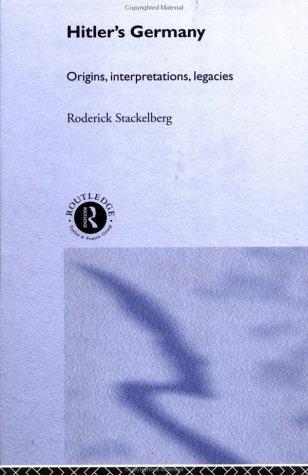Hitler's Germany : origins, interpretations, legacies [1999]
In Research Room

General Information
Original Title
Hitler's Germany : origins, interpretations, legacies / Roderick Stackelberg.
General Information
Language
English
General Information
Published
London ; New York : Routledge, 1999.
General Information
Physical Description
x, 307 p. ; 24 cm.
Contents Summary
Hitler's Third Reich often seems like an aberrant historical episode that defies rational explanation. Hitler's Germany seeks to provide context to this period by viewing the development of Nazism from the broader perspective of nineteenth- and twentieth-century German history. The book's interpretive focus offers insight not only into how Nazi Germany evolved, but also into its underlying causes and reasons.
Starting with the great ideological movements of the past two centuries, Roderick Stackelberg examines the cultural, political, and economic factors that led to the Nazi's rise to power in 1933. He presents detailed coverage of Germany up to 1945, paying special attention to World War II and the Holocaust. The book concludes with a discussion of the legacies of Nazism, the bitter disputes it has provoked among German historians, and the evolving meaning of the Nazi experience today.
Subjects
Subject Terms
National socialism -> Philosophy.
Holocaust, Jewish (1939-1945) -> Causes.
Political culture -> Germany.
Germany History 1933-1945 Historiography.
Bibliographic Information
ISBN
0415201144
0415201152 (pbk.)
Holdings
| Item Type | Current Location | Collection | Call Number | Volume Info | Shelving Location | Public Note |
|---|---|---|---|---|---|---|
| Book | OSA Archivum Library | General collection | 943.086/072 STA | - | General Stacks | - |
Hitler's Germany : origins, interpretations, legacies [1999]
In Research Room

General Information
Author
Stackelberg, Roderick, 1935-2018.
General Information
Original Title
Hitler's Germany : origins, interpretations, legacies / Roderick Stackelberg.
General Information
Language
English
General Information
Published
London ; New York : Routledge, 1999.
General Information
Physical Description
x, 307 p. ; 24 cm.
Contents Summary
Hitler's Third Reich often seems like an aberrant historical episode that defies rational explanation. Hitler's Germany seeks to provide context to this period by viewing the development of Nazism from the broader perspective of nineteenth- and twentieth-century German history. The book's interpretive focus offers insight not only into how Nazi Germany evolved, but also into its underlying causes and reasons.
Starting with the great ideological movements of the past two centuries, Roderick Stackelberg examines the cultural, political, and economic factors that led to the Nazi's rise to power in 1933. He presents detailed coverage of Germany up to 1945, paying special attention to World War II and the Holocaust. The book concludes with a discussion of the legacies of Nazism, the bitter disputes it has provoked among German historians, and the evolving meaning of the Nazi experience today.
Subjects
Subject
Hitler, Adolf, 1889-1945.
Subjects
Subject Terms
National socialism -> Philosophy.
Holocaust, Jewish (1939-1945) -> Causes.
Political culture -> Germany.
Germany History 1933-1945 Historiography.
Bibliographic Information
Library Special Collection
Bibliographic Information
ISBN
0415201144
0415201152 (pbk.)
Holdings
Book - 943.086/072 STA
Item Type
Book
Current Location
OSA Archivum Library
Current Location
OSA Archivum Library
Call Number
943.086/072 STA
Volume Info
-
Shelving Location
-
Public Note
-
